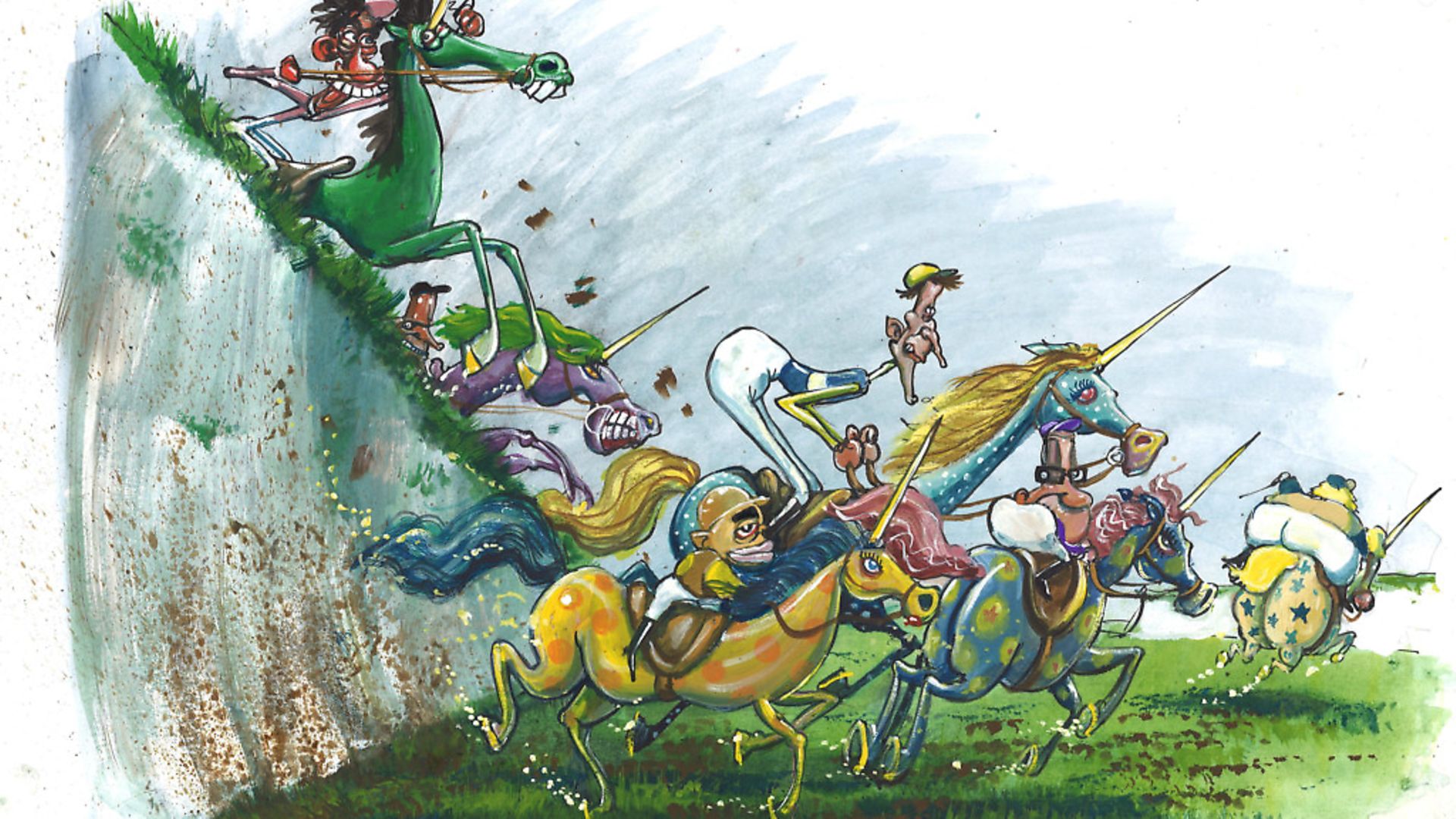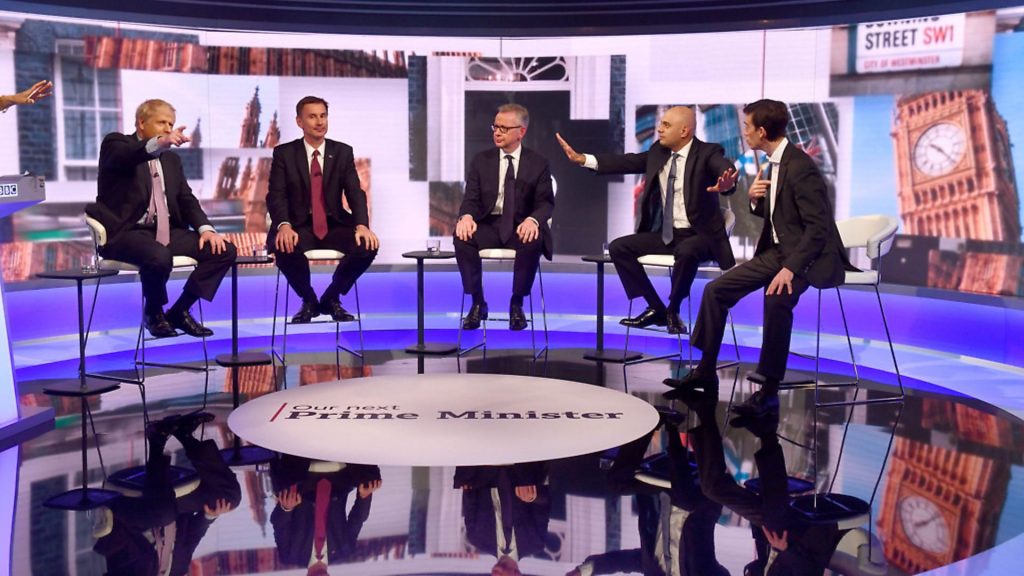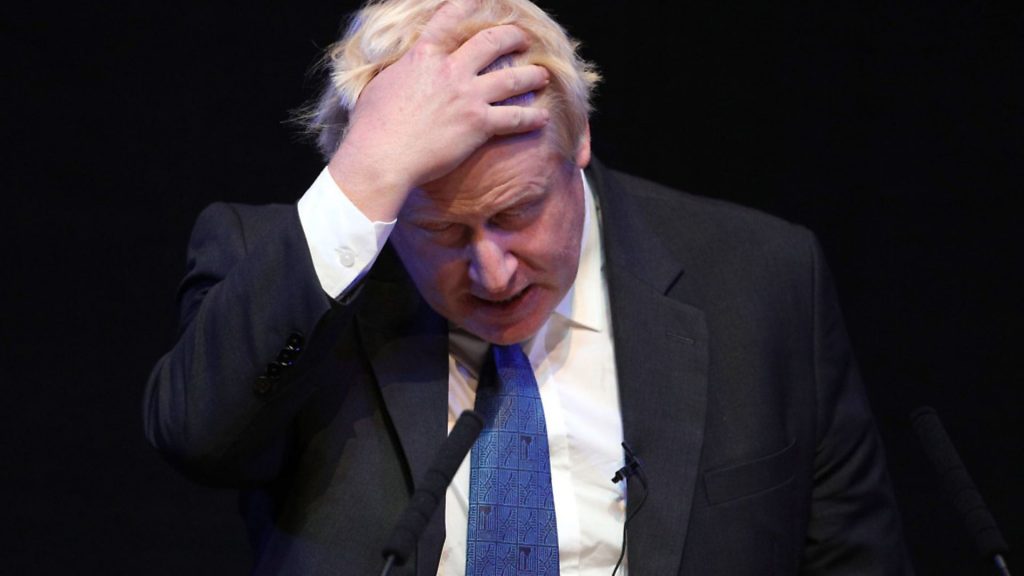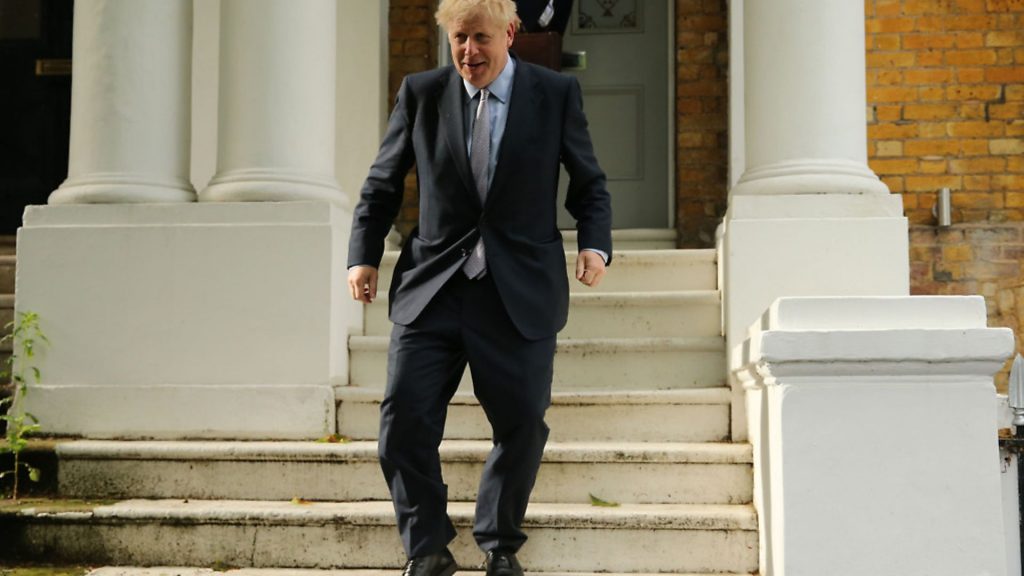
MICHAEL WHITE on the coronation of Boris Johnson looms in the Tories’ fantasy leadership race.

Talk about trying to leave Europe and not being able to go. We turned up at the Gare du Nord at the weekend after a brief visit to friends in Paris and found a long queue for the Eurostar snaking its chaotic way across the station while the authorities dealt with a bomb scare. Rather slowly. Symbolically, it felt like a Boris Moment. Tuesday night’s television debate on BBC1 was nowhere near as exciting.
This was not your routine bomb scare triggered by Islamic fundamentalists or other right-wing race nutters, I should add. No, this one arose because some bright spark had decided to bring home a souvenir from the D-Day Normandy beaches. An unsporting metal detector at the Gare du Nord prompted a call to the bomb squad. The city’s only one, it took a while to arrive. But in France rules are rules.
Sweltering for two hours under those hot glass roofs on a sunny day, the queue behaved pretty well. Nobody speculated that the idiotic souvenir hunter was probably a nostalgic Brexit voter (or even a Remain one), not even me, though I thought it. That may be Lesson No.1. Contrary to the gloomy portrait of a bitter and divided Britain which Deborah Mattinson’s ‘Britain Thinks’ survey of social attitudes found for the Observer, a more familiar mood of cheerful realism is still there to be tapped by skilful political leadership, if any turns up.
The railway staff did their best, but Eurostar-to-London matters less to them than to us. Even on a good day, border arrangements, passports and security checks for travellers at the Gare du Nord are inferior to those at London St Pancras. That’s Lesson No.2 for Brexit. Leaving Europe is going to inconvenience them less than it will us, especially if the next British government is carrying a hard Brexit bomb in its luggage as it dashes to catch the last Eurostar train for St Pancras on October 31.

Lesson No.3 barely needs repeating. Whenever I visit a major EU city – five in the past year – I am reminded how much our behaviour and habits have converged in recent decades, what a melancholy business the looming Brexit divorce is. France is very much a producer-facing culture where consumers come second – and their food is not quite as good as they tell each other. Their urban cyclists don’t wear Lycra or treat the pavement like a Tour de France, unlike some we could all mention. It’s a mixed bag, but our shared bag.
How accurate are reports drifting across the Channel that the mood among the mood among the EU27 is shifting in the impatient direction of Emmanuel Macron? During the last Crunch-Monday-to-Friday the French president wanted to force the dithering Brits to make up their minds and go. He was persuaded by more emollient colleagues (ie chancellor Merkel) to accept a compromise date for an extension, October 31, not New Year’s Eve. With due respect to Michael Gove’s plans for a mini-extension, it might now be a kindness to force the pace: do it or don’t.
It’s more than likely that the EU’s mood is hardening, as it is here, I’d say. That leaked cabinet paper which the FT reported last week acknowledged that the disruption of just-in-time supply chains during a hard Brexit would hurt the 27 too – pharmaceuticals were singled out – but much less than it will the still under-prepared Brits. Some 40% of us reportedly favour a no-deal departure, most with no more understanding of how chaotic it would be than “WTO Rules” Duncan Smith.
Yet no-deal remained a serious option for all five surviving candidates after Tuesday afternoon’s round two elimination of Dominic Raab for Theresa May’s job as party leader and PM. That is astonishing. There have been a series of private hustings, a press hustings and two television debates – the second graced by the self-styled ‘World King’ himself who also gave an interview to Radio 4’s World at One and a confusing Brexit briefing to “F*** business” leaders.

Yet voters – all of us, not just Tory Costa Geriatrica inactivists who will pick the winner – are still in the dark about the most important choice Britain has made for 50 years.
The World King himself admits his own and Kit Malthouse’s Brexit blueprint – fixing the Irish border via new technologies and a longer transition, would you believe? – will be seen as a bit of a “unicorn” in Brussels, where he once filed so many unicorn exclusives for the Telegraph. But, with the conspicuous exception of Rory Stewart, this has been a Unicorn Grand National (hat-tip, Faisal Islam, BBC’s economics editor-elect), one in which the bookies’ ‘runaway favourite’ has given new meaning to the phrase by running away from the race.
It was halfway over, the field of rival unicorns much thinned by falls, before much-fancied Trouserless Trappist (4/7) deigned to stumble over a couple of low fences. His race strategy was all too clear: a shortcut across the course which would allow him to trot towards the finishing line without his Australian jockey, Lynton ‘Dog Whistle’ Crosby having to apply the whip.
Yet the punters who were backing most don’t mind. Facing the BBC’s Emily Maitlis, Johnson was shifty and evasive on key points – tax, the Irish border, 40% tariffs on Welsh sheep farmers – and buck-passing on his role in the jailing of Nazanin Zaghari Ratcliffe. But he committed no fatal blunders that the fan club will have spotted. As for MPs, they may have flinched, but are in too deep. Only Johnson can defeat Johnson now. He is trying to be Boring Boris.
What had been happening with painful clarity since the Runaway garnered a dominant 114 of the 313 available – 157 is the target – votes in the first round is that most rivals almost immediately embarked on the process of paying homage to the likely winner in order to keep their place around the cabinet table.
Most of us have been in humbler versions of that position and it’s inevitably not great for the dignity. First round runner-up, Jeremy Hunt, was the only one to call him out (“where is he?”) in Channel 4’s Sunday night debate, but he too was busy sucking up. There was no ganging up on Tuesday.
Hunt was supposed to be the safe pair of hands, the Remain-to-Brexit realist who could be nice to foreigners and provide steady managerial experience to getting Britain out without what he dared say would be a potentially disastrous no-deal. That was his unique selling point, his USP. But in the present fevered atmosphere it hasn’t worked, has it? Not the hoped-for 50 to 70 votes, but 43 to Gove’s 37, 27 for Dominic (“I’m ‘ard”) Raab and just 27 to Sajid Javid. Boris can’t wait to outshine Hunt in a one-to-one.
Worse for his appeal to sensible MPs, the foreign secretary showed a lack of moral fibre in saying his agreed “150%” (no good on maths either?) with the sentiment – not tone, gosh, no – of Donald Trump’s latest “stab city” attack on Sadiq Khan’s record as mayor of Londonistan (sic).
The knife crime crisis has complex causes, all of them depressing, but few can be blamed on mayor Khan’s lacklustre regime in City Hall. It’s dog whistle stuff and disappointing. Hunt already had form in the pandering department: remember that Soviet prison camp comparison which so offended EU leaders for whom it is no mere metaphor. Baroness Warsi’s gallant attempt to rescue Hunt made it all worse. He’s applying to be a unifying prime minister, not to outrun Boris in the Epsom Abuse Stakes.
With Andrea Leadsom and Esther McVey getting their just deserts from fellow MPs in Round 1, the interesting switch was pro-Remain, 20-vote Matt Hancock’s decision to pull out. At his age and position, that was wise in itself. Alas, it was offset by his opportunist move to leap astride the Johnson unicorn in contradiction of sensible comments he had just made about needing a deal. The switch was the sort of thing we expected from Leadsom and McVey – and were not disappointed by either.
But the past 20 years has promoted a populist crisis where ego promotes feeling over analysis, crowd sentiment over expertise if you prefer. That must have been why the Stop Boris talks between the also-rans quickly floundered. They could agree on the need to consolidate behind one candidate, but each felt it should be MEEEE!. By Tuesday the home secretary was forced, reluctantly I’m sure, to remind everyone that his dad once drove a bus – though not over a cliff – and that he came up the hard way. No Eton and Oxford for The Saj, an under-achieving Bristol comprehensive, Exeter University and the Chase Manhattan bank. All against heavy odds. It’s not enough.
There was a brief mid-century period after the aristocracy’s grip was prized off politics when this kind of self-made meritocracy looked like becoming the new normal. Three Etonian Tories, Eden, Macmillan and Home, were followed by Labour’s Harold Wilson, then three grammar school Tory PMs, Heath, Thatcher and Major. The latter was an early school leaver (15) like Labour’s Jim Callaghan (13), but not Fettes’s Tony Blair. Meanwhile the Eton-led elitists then regrouped and bounced back on populism’s coat-tails, Trump-style. I sometimes fear that Labour’s 1970s assault on elite state grammar schools played a part in this regression.
Either way we now know the unconvincing grammar interludes of Brown and May will be followed by another public school PM. That includes Dulwich College’s academic runaway, Nigel Farage, according to YouGov’s survey of alleged Tory party members. Shockingly, 43% would happily see the UKIP runaway as their own party leader, the Times reported. Farage rejects talk of a pact with the Tories, as does the World King, who also says he won the London mayor’s contest without Farage: a Jesuitical bit of dishonesty, given the capital’s political DNA and liberal Boris’s former ability to cross-breed unicorns with chameleons.
This talent may now be a dwindling asset as Boris the Unicorn trots towards the finishing line. Even blue collar bruiser, Steve Baker MP, has belatedly spotted that Boris must have been spinning different lines to different MPs to reassemble his ‘One Nation’ coalition. But which nation, liberal or reactionary? Is he for a no-deal Brexit rather than compromise – or for a tweaked version of May’s thrice-rejected deal? Is Uxbridge’s MP still “lying down in front of the bulldozers” with local opponents of Heathrow’s proposed third runway – back in the headlines – or for lying to his constituents about it? He was openly evasive again on Tuesday.
And where does he stand on HS2? How will he cut taxes for people like himself while spending more on public services which people like himself don’t use? Justice secretary David Gauke, former Treasury No.2, bravely mocked Johnsonian fiscal nonsense at the weekend, though he could have added Theresa May’s series of costly announcements – notably on carbon-cutting targets. Her piety amounts to a forlorn attempt to bolster her thin legacy with commitments which no successor will feel obliged to honour.
Gauke also suggested the PM-in-waiting’s choice of chancellor would have to be a masochist. Perhaps it was his counter-intuitive bid for the job. Probably not. More likely the comment reassures us that not all politicians are the time-servers of caricature. In urging his own party to clamber off the marginalised irrelevancy of Jeremy’s rickety fence and unequivocally to embrace the Remain cause, Labour’s Tom Watson performs a similar disinterested service, rewarded on Wednesday when Labour’s NEC edged (too late?) towards endorsement of a second referendum. Self-sacrificing too was May’s de facto deputy and fixer, David Lidington, in endorsing Rory Stewart’s quixotic candidacy and putting the frighteners on Boris’s old dad, Stan Johnson who warned against an ‘Eton vs Eton’ final. The flagrant opposite of disinterested.
Ah, Rory Stewart. For a candidate with just 19 votes in the first round his buoyancy has proved the surprise in the Unicorn Grand National. It isn’t that his hope to push through a soft version of the May deal isn’t as improbable as it became to her. Plenty of smart folk think that’s roughly where Johnson will end up with added waffle, that or a risky general election. Nor is Stewart’s USP those walkabouts. It’s his refreshingly disarming candour about our limited options on Brexit and about Boris which has attracted unlikely support. That and the media’s desire to turn a predictable outcome (Boris beats Hunt) into a horse race. After a TV performance which fell well short of a game-changer, by Wednesday morning that dream scenario was fading – like Mr Stewart’s disappearing tie.
Surely the point about Stewart’s ability (“I’m the only economic Conservative in the race”) to cut through is that his direct manner of speaking his mind, however eccentrically, is the real thing. In contrast, Johnson’s declared rejection of “muffling and veiling our language” in the name of political correctness is itself a deception. Far from using his considerable vocabulary and intelligence to speak “as directly as I can”, Boris uses it as camouflage. He does so as much over his teenage drug usage or middle-aged sexual adventures as on Brexit.
There is always a case for ambiguity in politics, for a leader to keep his or her true intentions under wraps awaiting an opportunity or for the tide to turn. That is not the same as Donald Trump’s erratic unpredictability, easily outmanoeuvred by patient masters of deception in Tehran or Beijing. It is about politics as opportunism in the better sense of the word rather than in the Boris sense of being eager to please, all things to all voters, but having no fixed convictions himself.
It is worse than that. As the FT’s Robert Shrimsley points out, Johnson panders to victimhood, he mocks “letter-box burkas”, “picaninnies” and “bum boys”. In short, he bullies down and tax-cuts up, he polarises rather than unifies, the more so when he is cornered. Again it is just like Trump. Long before Christmas he may well be cornered by events, by Farage and Steve Baker, by a Labour front bench which may finally have its ducks in a proper row. Stewart was mocked by his Kool Aid rivals for saying a deal which parliament and Brussels can both accept is the only way out of a locked room. But they don’t have one either.









